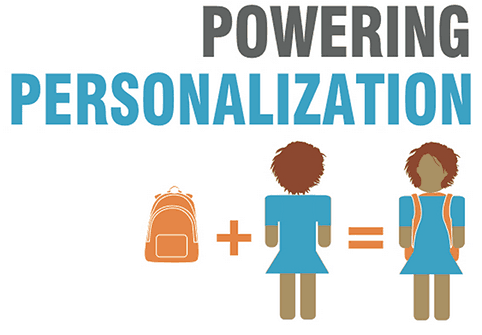Personalization + Privacy = Data Backpack

In October 2012, Digital Learning Now & Getting Smart released Data Backpacks: Portable Records & Learner Profiles report and Powering Personalization infographic. Situated in a backdrop of “new personalization technologies” and “demand for differentiated instruction,” we argued that “current student records and transcripts are insufficient to meet the evolving needs of teachers, students and parents.”
We identified these problems with the current system:
- The current official transcript does not provide enough information for teachers to personalize learning from the first day of school.
- Customized learning requires an enhanced and expanded Learner Profile.
- Parents and teachers should have better mechanisms to protect sensitive student data while also empowering multiple providers to use and contribute to a Learner Profile.
Much has happened over the three years since the release of the report. The Aspen Task Force on Connected Learning endorsed the concept for a data backpack, particularly in an era where students are engaged in learning activities inside and outside of school. Utah passed legislation creating a Student Achievement Backpack. Recognizing the importance of protecting student privacy in this connected learning environment has led more than 151 companies to sign a voluntary pledge for safeguarding data. The Data Quality Campaign led a diverse coalition endorsing principles for the use and protection of student data. And Georgia passed one of the most comprehensive data privacy laws in the country that balances the need to better empower parents without closing off innovative instructional models.
Our original exploratory questions are more relevant now than ever:
- What if students came to each course or classroom with a digital backpack of data about their learning levels, preferences, motivations, and personal accomplishments?
- How would this improve each teacher’s ability to tailor learning to meet the needs of individual students?
- What if parents and students could easily access their child’s records to share the information with afterschool providers of their choosing?
- How would all of the personalization this affords add up to deeper learning and improved college and career readiness?
Our research generated two primary recommendations for addressing the inadequacies of today’s student records in order to power personalization and acknowledge student privacy–The Data Backpack & The Expanded Learner Profile.
The Data Backpack: The Data Backpack is an expanded common electronic student record: an official transcript that follows students through every transition—grade to grade and school to school. The Backpack includes traditional transcript data such as demographic information, state testing data, and supplementary student supports. However, it would also include additional information in order to represent a more holistic picture of a student’s work and achievement—such as a gradebook of standards-based performance data and a portfolio of personal best work samples—and better capture the student’s progression at any moment in time. This enhanced data would provide additional context to shed light on attendance and behavior patterns, supplementary support services, grades, and other performance information such as proficiency scores and learning gains.
The Expanded Learner Profile: The Expanded Learner Profile builds on the “official transcript” of the Data Backpack to provide additional clues to unlock learner needs, preferences, and potential. While each student’s Data Backpack would be populated by a set of common elements for all students at a new minimum level, the components of each student’s Learner Profile could be customized based on student needs, platform data requirements, and family decisions.
Beyond describing a vision for this approach, our report recognized a number of barriers, including several that continue to weigh heavily on the field. These issues include clarifying ownership of student data, technical and translational issues, collaboration concerns and the need to consider potential unintended consequences. With the experience of the past three years in mind, we would add to this list a greater appreciation for implementation challenges. Key concerns here including the motivation needed to bring multiple stakeholders to come together to adopt this approach as well as advancing this model in a way that builds in security and privacy protections up front to build trust with teachers, students, and parents.
In the conclusion, we acknowledged that the contribution that the first paper made:
We believe there is a threefold challenge before us: a definitional challenge, a legal challenge, and a technical challenge. Together we need to answer the following questions: (1) What kind of data are we talking about? (2) What legal guidance is required for custodians and users of the data? And (3) How do we safely and securely move the data in ways that both maintain its integrity and make it maximally useful?
Our first paper focused largely on the definitional challenge. We described the potential of the Student Data Backpack and Expanded Learning Profile and acknowledged that much work remained to address the technical and legal/political challenges.
To explore those ongoing challenges and in an effort to continue to move this work forward, we are kicking off a new blog series that will feature insights from the original authors as well as other members of the ExcelinEd and Getting Smart teams. We’ll also share the voices of those who have been actively working to implement similar policies and initiatives.
We believe the Student Data Backpack and Expanded Learning Profile address both the potential of student data to personalize learning and a path to protecting student information. This is not just a huge problem to solve, but a huge opportunity to seize.
This post is a part of a Student Data Backpack blog series in the upcoming “Getting Smart on Personalization and Privacy” Smart Bundle produced in partnership with the Foundation for Excellence in Education’s Digital Learning Now initiative (@DigLearningNow) and the Data Quality Campaign (@EdDataCampaign). Join the conversation on Twitter using #EdData.
For more from ExcelinEd, check out:





0 Comments
Leave a Comment
Your email address will not be published. All fields are required.